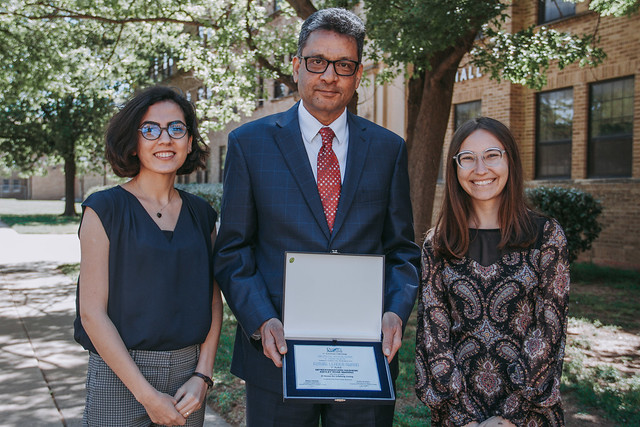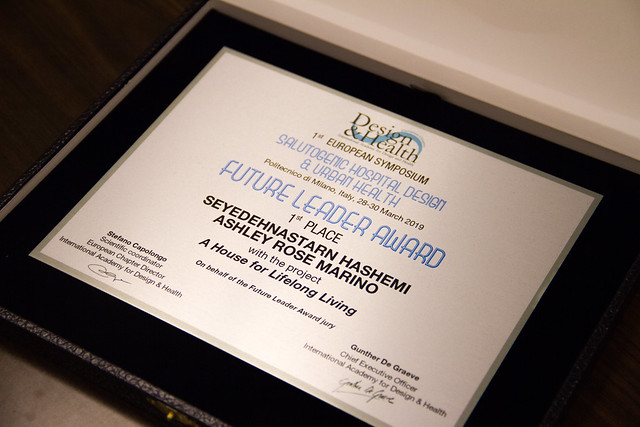Texas Tech Graduate Students Win European Design and Health Future Leader Competition
Designing for residential healthcare: Student design with global perspective
 Graduate students Ashley Rose Marino and Nastaran Hashemi in the Department of Design at Texas Tech University were recently named winners of the European Design and Health
Future Leader Award. This worldwide recognition designates participants and winners
as great producers of design innovation.
Graduate students Ashley Rose Marino and Nastaran Hashemi in the Department of Design at Texas Tech University were recently named winners of the European Design and Health
Future Leader Award. This worldwide recognition designates participants and winners
as great producers of design innovation.
The Future Leader Award is part of an international design competition created for undergraduate and graduate students by the European chapter of the International Academy Design and Health. The project sets out to encourage the next generation of interior and environmental designers to tackle issues and strategies in healthcare with the aim of sharing new design thinking for health in modern environments.
Ashley is pursuing a master's degree in Environmental Design at Texas Tech. Nastaran is working towards a Ph.D. in Interior and Environmental Design. The students were guided by Department of Design Professor, Debajyoti Pati, Ph.D., as a final project component of the Acute Care Design course.
When the pair of graduate students set out to begin their project, they reached out to the Lubbock community. The two met with a local couple who wanted a home that would support their lifestyle as they age. After gathering data regarding the existing condition of the home, Ashley and Nastaran interviewed the couple to better understand their needs.
The main focus for the project centered around salutogenesis, which is a concept that supports one's overall healthy lifestyle and well-being, rather than relying on factors that cause disease.
"We wanted to make a home that went beyond breaking barriers," Ashley said. "The idea of our home was simple: we wanted to create a space that could help bring happiness to the residents' lives while also promoting health and wellness. Our extensive research is what set this project apart from the rest."
As someone who did not come from an undergraduate design background, Ashley says that this project challenged her to dive into the world of interior and environmental design with a unique hands-on approach.
"I chose this degree because there are few universities that offer a research-focused degree in interior design," Ashley said. "I felt that this program was the perfect way to merge my loves for psychology and interiors."
Interior and Environmental Design doctoral student, Nastaran, is focusing her graduate research on healthcare design.
"This line of research fascinates me because I can improve the lives of people," Nastaran said. "The high-quality studies that have been conducted in the Department of Design were one of my motivations to choose this degree. I think my background as an architect can assist me to understand the real needs in the industry so I can address them in my projects."
Nastaran and Ashley worked together to combine their knowledge and newly gained information about the home to create an evidence-based design that would support an aging couple in their own home.
 "As we know the U.S. population is getting older," Nastaran said. "Consequently, the
demand for healthcare is increasing. Although most people like to age in their own
home, independent living is a huge concern for them. Because most of the homes in
the U.S. are not designed for lifelong living. In my opinion, good design is about
solving problems. Thus, our main goal in this project was to facilitate aging in place
and subacute care delivery in residential homes."
"As we know the U.S. population is getting older," Nastaran said. "Consequently, the
demand for healthcare is increasing. Although most people like to age in their own
home, independent living is a huge concern for them. Because most of the homes in
the U.S. are not designed for lifelong living. In my opinion, good design is about
solving problems. Thus, our main goal in this project was to facilitate aging in place
and subacute care delivery in residential homes."
Dr. Pati notes that his students were able to address a concern that affects many people in their lives—receiving long-term care in one's home environment.
"In my class, my main emphasis for assessment is on innovation," Dr. Pati said. "Students are forced to think outside the box to come up with solutions that are new. In addition to developing innovative ideas and solutions, students are guided on effective representation of the ideas to render it comprehensible to the general audience."
In addition to the students researching issues faced by elderly residents in Lubbock as a case study, students in Dr. Pati's acute care course were able to hear from the Covenant Health home-care team, who shared first-hand experiences and expertise surrounding issues they often face in residential care.
"Dr. Pati is one of the leaders in the field of healthcare design," Nastaran said. "His high-quality research and his vision about research and design was the main reason that motivated me to pursue my study toward a Ph.D. at Texas Tech University."
When reflecting on the experience, Ashley said she learned how spaces can either limit an individual or allow them to thrive in a space.
"Dr. Pati's expertise is beyond comprehension and it's truly an honor to work with someone as experienced and knowledgeable as he is," Ashley said. "The importance of making all spaces accessible is what will stick with me throughout the rest of my career."
College of Human Sciences
-
Address
College of Human Sciences, Texas Tech University, P.O. Box 41162, Lubbock, TX 79409-1162 -
Phone
(806) 742-3031 -
Email
hs.webmaster@ttu.edu
